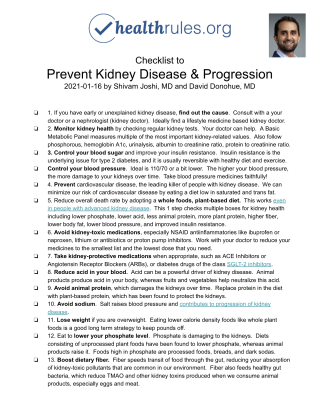The Checklist
If your goal is to preserve your kidneys and prevent kidney disease...
Kidney disease is common! We are generally born with 100% kidney function, and it usually declines with age. Your eGFR stands for estimated Glomerular Filtration Rate. It is a measure of your kidney function, and it roughly reflects the percentage that your kidneys are still functioning at. When it gets down below 15 we are functioning at roughly 15%. This is the level at which we often need to go on dialysis. Kidney transplant can be life extending for people with advanced kidney disease, but donor kidneys are hard to come by.
More worrisome than the specter of dialysis is the risk of cardiovascular disease and death. This is the #1 cause of death for people with chronic kidney disease. People with kidney disease are far more likely (16-40 times!) to succumb to cardiovascular disease than to progress to dialysis. So much of our mission for people with kidney disease is to not only preserve the kidneys, but to prevent cardiovascular disease.
Traditional medicine typically focuses on some important topics like drugs, neutralizing acidemia with bicarbonate, and ultimately, the kidney transplant. These are all vital to kidney health. Traditional medicine typically ignores the topic of nutrition, and at times gets it backwards. Part of the disconnect comes because doctors are generally not taught nutrition at all in the course of their 24+ years of education. Part of the problem is paternalistic traditionalism. For example, UpToDate, one of the most trusted sources for traditional medical information, offers:
"Restricting protein in the diet may slow the progression of CKD, although it is not clear if the benefits of protein restriction are worth the difficulty of sticking to a low-protein diet, particularly when other medications to slow progression of CKD are used. Although a reduced-protein diet may delay dialysis for several years, the unappetizing nature of the diet is difficult for most people to tolerate."
Another reason for traditional medicine's systematic failure to recommend plant based diets for kidney health is concern for potassium and phosphorous. Whole plant foods contain large amounts of these nutrients. However it is not what you eat, it's what you absorb. Recent research suggests that whole food plant based diets do not raise potassium or phosphorous on average, because these nutrients are packaged with fiber and other compounds which control their absorption. So most of the concern has been unfounded.
Be sure to involve your health care provider to help monitor your levels.
Checklist to Prevent Kidney Disease and Progression
- If you have early or unexplained kidney disease, find out the cause. Consult with a your doctor or a nephrologist (kidney doctor). They can help identify the underlying cause and help optimize your medicines for kidney health. Ideally find a lifestyle medicine based kidney doctor who has knowledge around how healthy lifestyle can help.
- Monitor kidney health by checking regular kidney tests. You can't feel how your kidneys are doing so we need to monitor blood and urine tests. Your doctor can help. A Basic Metabolic Panel measures multiple of the most important kidney-related values. Other blood tests you should consider following: phosphorous, hemoglobin A1c. Helpful urine tests include: urinalysis, albumin to creatinine ratio, protein to creatinine ratio.
- Control your blood sugar and improve your insulin resistance. Ideal for kidney (and general) health is to have a Hemoglobin A1c less than 5.7, without the need for diabetes drugs like insulin. Insulin resistance is the underlying issue for type 2 diabetes, and it is generally completely reversible with healthy diet and exercise. See our checklist: Reverse Insulin Resistance and Type 2 Diabetes.
- Control your blood pressure. Ideal level is around 110/70 or a bit lower. If you have kidney disease, you do NOT want to develop hypertension. The higher your blood pressure, the more damage to your kidneys over time. Take your blood pressure medicines faithfully! Work with a healthcare provider who is an expert in wellness and prevention to keep your blood pressure at a normal level. Eating a DASH style diet can reverse hypertension as quickly as 4 weeks.
- Prevent the leading killer. Cardiovascular disease is the leading cause of death for people with kidney disease. We can minimize our risk of cardiovascular disease by eating a diet low in saturated and trans fat.
- Reduce overall death rate by adopting a whole foods, plant-based diet. This works even in people with advanced kidney disease. This 1 step checks multiple boxes for kidney health including lower phosphate, lower acid, less animal protein, more plant protein, higher fiber, lower body fat, lower blood pressure, and improved insulin resistance.
- Avoid kidney-toxic medications, especially NSAID antiinflammatories like ibuprofen or naproxen. These are a common cause of kidney damage. Other medicines like lithium or antibiotics or proton pump inhibitors can do damage to the kidneys. Work with your doctor to reduce your medicines to the smallest list and the lowest dose that you need.
- Take kidney-protective medications when appropriate. Talk with your doctor if you should be taking blood pressure medicines called ACE Inhibitors or Angiotensin Receptor Blockers (ARBs), or diabetes drugs of the class SGLT-2 inhibitors.
- Reduce acid in your blood. Acid can be a powerful driver of kidney disease. Animal products produce acid in your body, whereas fruits and vegetables help neutralize this acid as much as medicine.
- Avoid animal protein, which damages the kidneys over time. Replace protein in the diet with plant-based protein, which has been found to protect the kidneys.
- Avoid sodium. Salt in the diet raises blood pressure and contributes to the progression of kidney disease.
- Lose weight if you are overweight. Eating lower calorie density foods like whole plant foods is a good long term strategy to keep pounds off.
- Eat to lower your phosphate level. Phosphate is damaging to the kidneys. Diets consisting of unprocessed plant foods have been found to lower phosphate, whereas animal products raise it. Foods high in phosphate are processed foods, breads, and dark sodas.
- Boost dietary fiber. Fiber speeds transit of food through the gut, reducing your absorption of kidney-toxic pollutants that are common in our environment. Fiber also feeds healthy gut bacteria, which reduce TMAO and other kidney toxins produced when we consume animal products, especially eggs and meat.
Listen to a podcast about this checklist
Contributors

Shivam Joshi, MD
Dr. Joshi is a board certified nephrologist and Clinical Assistant Professor at the NYU Grossman School of Medicine. He has authored multiple scientific works on the topic of plant based diets and kidney health, including his recent AJKD paper Plant-Based Diets for Kidney Disease: A Guide for Clinicians.

David Donohue, MD MS FACP DipABLM
Dave is the creator of healthrules.org and helped build this checklist. He is a primary care internist, fellow of the American College of Physicians, and a diplomate of the American Board of Lifestyle Medicine.
Handout

References
Joshi S, McMacken M, Kalantar-Zadeh K. Plant-Based Diets for Kidney Disease: A Guide for Clinicians. Am J Kidney Dis. 2020 Oct 16:S0272-6386(20)31045-3. doi: 10.1053/j.ajkd.2020.10.003. Epub ahead of print. PMID: 33075387.
Berns, Jeffrey S. Patient education: Chronic kidney disease (Beyond the Basics). In: UpToDate, Post, TW (Ed), UpToDate, Waltham, MA, Aug 23, 2019. https://www.uptodate.com/contents/chronic-kidney-disease-beyond-the-basics
Wesson DE, Buysse JM, Bushinsky DA. Mechanisms of
metabolic acidosis–induced kidney injury in chronic kidney
disease. J Am Soc Nephrol. 2020;31(3):469-482.
Raphael KL, Carroll DJ, Murray J, Greene T, Beddhu S. Urine
ammonium predicts clinical outcomes in hypertensive kidney
disease. J Am Soc Nephrol. 2017;28(8):2483-2490.
Scialla JJ, Anderson CA. Dietary acid load: a novel nutritional
target in chronic kidney disease? Adv Chronic Kidney Dis.
2013;20(2):141-149.
de Brito-Ashurst I, Varagunam M, Raftery MJ, Yaqoob MM. Bi-
carbonate supplementation slows progression of CKD and improves nutritional status. J Am Soc Nephrol. 2009;20(9):
2075-2084.
Goraya N, Simoni J, Jo C, Wesson DE. Treatment of metabolic
acidosis in patients with stage 3 chronic kidney disease with fruits and vegetables or oral bicarbonate reduces urine angio-tensinogen and preserves glomerular filtration rate. Kidney Int. 2014;86(5):1031-1038.
Goraya N, Simoni J, Jo C, Wesson DE. A comparison of
treating metabolic acidosis in CKD stage 4 hypertensive kidney
disease with fruits and vegetables or sodium bicarbonate. Clin
J Am Soc Nephrol. 2013;8(3):371-381.
Goraya N, Simoni J, Jo C, Wesson DE. Dietary acid reduction
with fruits and vegetables or bicarbonate attenuates kidney injury in patients with a moderately reduced glomerular filtration rate due to hypertensive nephropathy. Kidney Int. 2012;81(1):
86-93.
Goraya N, Wesson DE. Dietary interventions to improve out-
comes in chronic kidney disease. Curr Opin Nephrol Hyper-
tens. 2015;24(6):505-510.
Ikizler TA, Burrowes JD, Byham-Gray LD, et al. KDOQI clinical
practice guideline for nutrition in CKD: 2020 update. Am J
Kidney Dis. 2020;76(1)(suppl):S1-S107.
Kelly JT, Palmer SC, Wai SN, et al. Healthy dietary patterns and
risk of mortality and ESRD in CKD: a meta-analysis of cohort
studies. Clin J Am Soc Nephrol. 2017;12(2):272-279.
Saglimbene VM, Wong G, Ruospo M, et al. Fruit and vegetable intake and mortality in adults undergoing maintenance hemo-
dialysis. Clin J Am Soc Nephrol. 2019;14(2):250-260.
Moe SM, Zidehsarai MP, Chambers MA, et al. Vegetarian
compared with meat dietary protein source and phosphorus
homeostasis in chronic kidney disease. Clin J Am Soc Nephrol.
2011;6(2):257-264.
Wu T, Chang C, Hsu W, et al. Nutritional status of vegetarians
on maintenance haemodialysis. Nephrology (Carlton).
2011;16(6):582-587.
Garcia-Torres R, Young L, Murray DP, Kheda M, Nahman NS Jr.
Dietary protein source and phosphate levels in patients on
hemodialysis. J Ren Nutr. 2020:1-7 https://doi.org/10.1053/j.
jrn.2019.11.006.
Kelly JT, Palmer SC, Wai SN, et al. Healthy dietary patterns and
risk of mortality and ESRD in CKD: a meta-analysis of cohort
studies. Clin J Am Soc Nephrol. 2017;12(2):272-279.
Saglimbene VM, Wong G, Ruospo M, et al. Fruit and vegetable intake and mortality in adults undergoing maintenance hemo-
dialysis. Clin J Am Soc Nephrol. 2019;14(2):250-260.
Humalda JK, Navis G. Dietary sodium restriction: a neglected therapeutic opportunity in chronic kidney disease. Curr Opin Nephrol Hypertens. 2014 Nov;23(6):533-40. doi: 10.1097/MNH.0000000000000073. PMID: 25222815; PMCID: PMC4189688.
Neuen BL, Young T, Heerspink HJL, Neal B, Perkovic V, Billot L, Mahaffey KW, Charytan DM, Wheeler DC, Arnott C, Bompoint S, Levin A, Jardine MJ. SGLT2 inhibitors for the prevention of kidney failure in patients with type 2 diabetes: a systematic review and meta-analysis. Lancet Diabetes Endocrinol. 2019 Nov;7(11):845-854. doi: 10.1016/S2213-8587(19)30256-6. Epub 2019 Sep 5. Erratum in: Lancet Diabetes Endocrinol. 2019 Dec;7(12):e23. PMID: 31495651.


